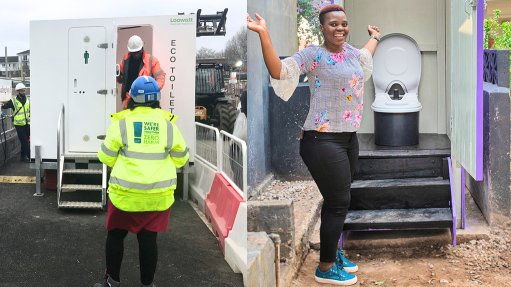
The Loowatt system can be positioned on a remote work site or in a community
A portable, waterless waste management system is able to convert waste into biogas which can then be used to generate electricity, cooking gas or organic fertiliser.
The Loowatt system includes a specially designed toilet that can be positioned on a remote work site, mine site, or in a rural or urban community that does not have access to sanitation services.
Once the toilet is flushed, waste is securely sealed and stored in barrels below the toilet. Full containers are then collected by a local service team. The waste is sealed in liners, helping to minimise unsafe practices, reduce the spread of germs and odours, and prevent human contact with the waste.
The sealed waste is taken to a local waste processing facility where it is separated from the film, which can be composted or recycled. The waste is then processed to ensure that it is contaminant-free and can be safely used as organic fertiliser, irrigation water, or turned into biogas to generate electricity and cooking gas.
Food waste can also be collected from households and markets, further contributing to waste transformation and job creation. Waste can be processed in a range of systems, from small, decentralised digesters to larger, utility-run treatment sites.
The system does not require a water source and does not need to be accessed by a vacuum-truck, which makes it easier to service and save on transport costs.
The Loowatt system aims to have a positive impact on housing and living conditions, job creation, social inclusion, and health and safety. Unlike pit latrines, which can be smelly and messy, the waterless toilets are designed to be safer and more pleasant to use and service. The regular collection and processing of human and food waste can also help reduce carbon dioxide (CO2) emissions.
In a trial conducted on a construction site in the UK, a 4-toilet Loowatt pod was positioned in a location that was convenient for workers and closer than the regular toilet facilities. It was found that over the course of two weeks, 32 hours of employee downtime was saved by reducing the distance it took to walk to ablution facilities, 1 000 l of water that would have been used in flush toilets, was saved and CO2 emissions, approximately equivalent to planting two trees, were reduced.
The Loowatt sanitation system has recently been implemented in parts of KwaZulu-Natal under the brand name Kalüla, with technology approval and funding from South Africa’s Water Research Commission and Unilever.
The system includes the option of software and mobile applications that can be used to manage customers and payments.